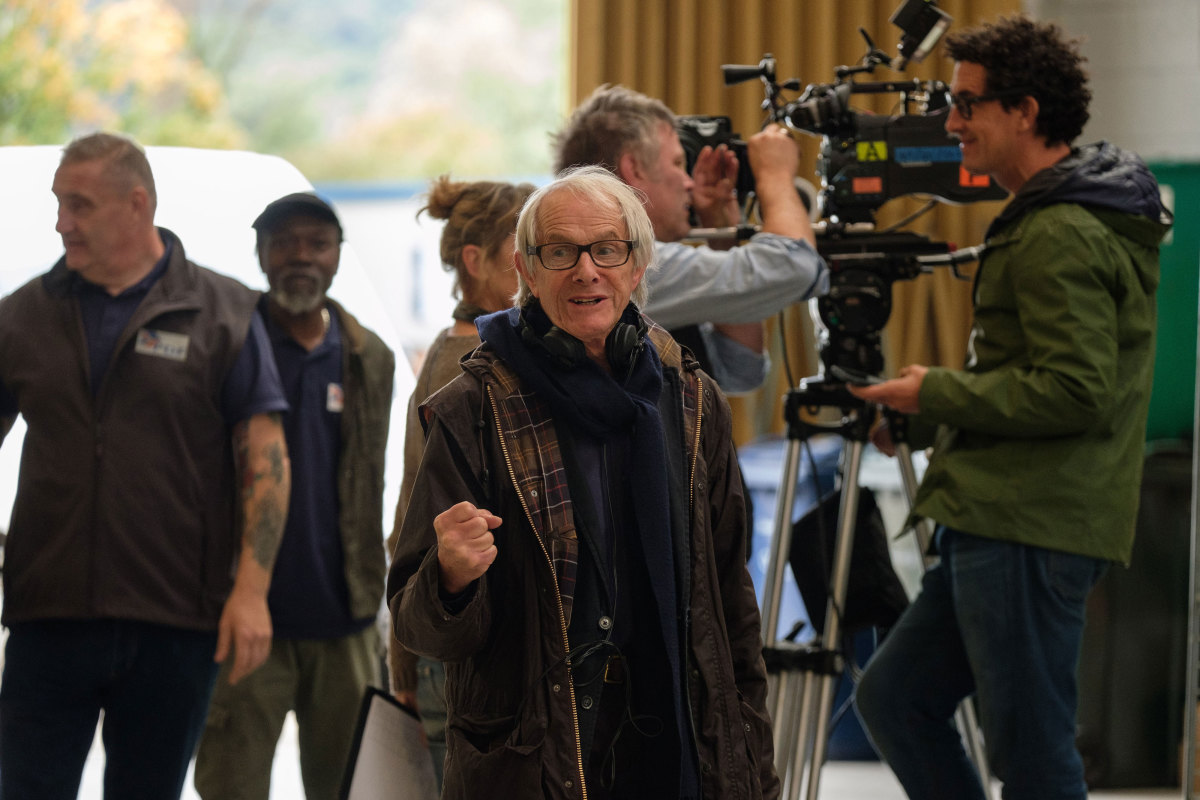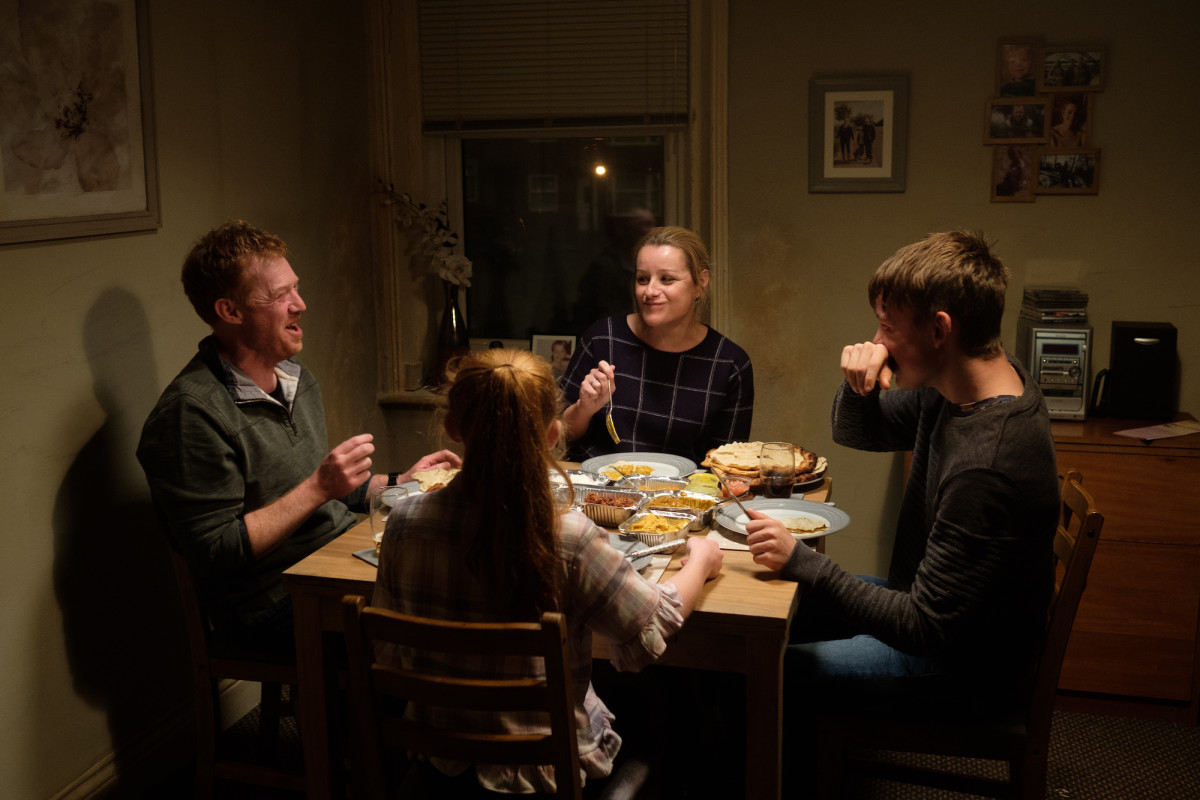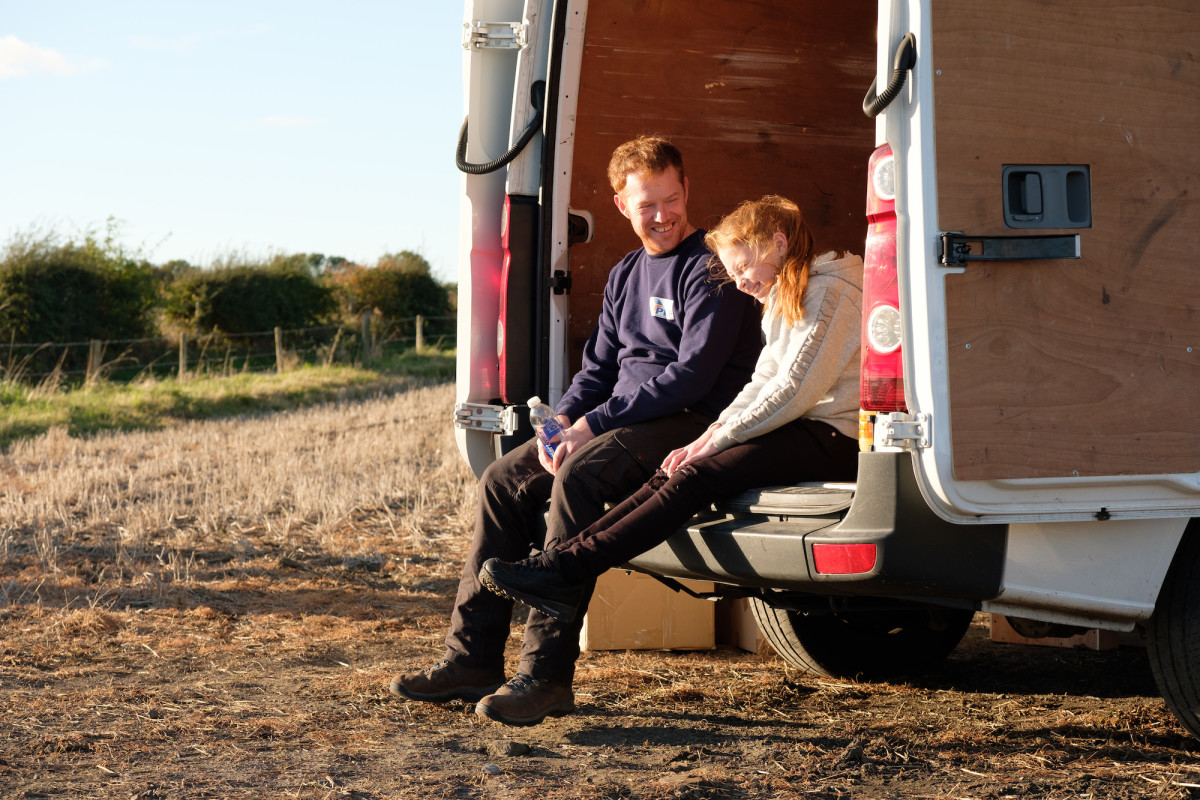Susan Kouguell speaks with Paul Laverty about his new film “Sorry We Missed You,” a wrenching, intimate family drama that exposes the dark side of the so-called “gig economy.”
Click to tweet this interview to your friends and followers!
I sat down with Paul Laverty in Manhattan to talk about screenwriting and his longtime partnership with director Ken Loach. Mr. Laverty is passionate about social injustice, which is not only reflected in his films with Loach but evident when he recalled researching various subjects for their projects and the people behind the actual stories.
About Screenwriter Paul Laverty

Born in Calcutta in 1957 to an Irish mother and Scottish father, he studied philosophy in Rome, then law in Glasgow. In the 1980s he worked for three years as a lawyer in Nicaragua, recording human rights abuses; he also travelled to Guatemala and El Salvador.
In 2002, Laverty won Cannes’ Best Screenplay award for Sweet Sixteen, about a young Scottish delinquent battling for a better life. In the same year, Laverty, Loach and their producer, Rebecca O’Brien, formed Sixteen Films, the company which has been behind most of their work since, as well as several films by other directors.
We spoke at length about his new film Sorry We Missed You a wrenching, intimate family drama that exposes the dark side of the so-called “gig economy.”
Sorry We Missed You
Ricky, a former laborer, and his home-attendant wife Abby—who lost their home in the 2008 financial crash—are desperate to get out of their financial distress. When an opportunity comes up for Ricky to work as his own boss as a delivery driver, they sell their only asset, Abby’s car, to trade it in for a shiny new white van and the dream that Ricky can work his way up to someday owning his own delivery franchise. But the couple find their lives are quickly pushed further to the edge by an unrelenting work schedule, a ruthless supervisor, and the needs of their two teenage children. Capturing the sacred moments that make a family, as well as the acts of desperation they need to undertake to make it through each day.
The Interview
Kouguell: Your first venture into screenwriting and subsequent meeting with Ken Loach was something that many aspiring screenwriters can only dream about.
Laverty: Yes, it was the one and only treatment I had ever done. I was working as a human rights lawyer in Nicaragua for three years and was an eyewitness to war in El Salvador and Guatemala, writing human rights reports. In my naivety I thought, I could write a screenplay (with no experience or training) about what I witnessed.
I had no idea what to do, so I bought a bunch of books and learned what a treatment was and wrote what I thought was a treatment and sent it to Ken. I sent it to everyone in the whole world and of course only a few people responded and those who did respond said, it’s a war zone, it’s in Spanish, and I hadn’t written a screenplay before and they said, thanks but no thanks. But Ken was very curious and said, ‘Come on, let’s meet for a cup of tea.’ He said, write a few drafts of scenes and that was a total collaboration.
The film was made a few years later, Carla’s Song (1996), in which Robert Carlyle’s Scottish bus-driver accompanies a Nicaraguan refugee back to her homeland at the height of the Sandinista/Contra conflict. The pair’s next films, My Name is Joe (1998) about a recovering alcoholic, and Bread and Roses (2000) spotlighted Latina workers in Los Angeles struggling to unionize.
The first time working with Ken, he insisted to come to Glasgow and said, ‘I always follow the writer.’ He’s a man who’s been making films for decades and I was green and had no idea what was going on. Writing was like a drug; I’ve never lost that sense of excitement when writing. I was very lucky to meet Ken. We’ve been working together for over 20 years.

Kouguell: How does your collaboration work? Does he come up with an idea or do you?
Laverty: It’s much more organic than that. Now we’re close friends and we’re always exchanging ideas and notions and conversations. Every project has had a different kind of beginning.
We do very different jobs. He directs and I write, but we meet in the middle as filmmakers. Every film is a different genesis. You find things that you have in common.
Ken is the most respectful man you’ll ever meet. He’s very respectful towards writers. He never calls it “A Ken Loach film”—he always demands that the writer has equal billing. I haven’t got an agent, that was all him from the beginning.
Ken always says the most creative thing in a film is the screenplay.
Kouguell: Sorry We Missed You and I, Daniel Blake share similar sensibilities.
Laverty: We imagined Sorry We Missed You as a companion piece to I, Daniel Blake. One was a cruel welfare piece and this one we decided to look at work. They grew out of each other. We were visiting the food banks in Scotland and England. In the past, food banks were usually for the unemployed, but now it was the working poor; they had jobs. There were families where two people were working, but still not getting through the month. We were asking ourselves, why is that?
Our last two films have grown out of a fascination with what’s underneath the surface. With I, Daniel Blake, something cruel was going on in the welfare system, the recipients were stereotyped, and the propaganda campaign was so successful; it was a grand lie. It was the right-wing press demonizing the poor. That whole cruelty of the welfare system was a way to support the gig-economy and the zero-contract culture that we have.
The gig-economy of bogus self-employment. You don’t get paid a wage; all the language is designed by lawyers about opening a franchise but it’s a deception. Instead of technology liberating people, it ties them even more. All that was fascinating.
Kouguell: InSorry We Missed You, there isn’t that stereotypical antagonist often found in many films. Here, they’re all trying to survive.
Laverty: Maloney, the boss, is in a place that if he doesn’t keep ‘the box’ happy everyone loses their jobs. The drivers are all cogs in a wheel.

Kouguell: Tell me about the research you did.
Laverty: It was harder to do the research for this one than in I, Daniel Blake—we usually find people through grassroots organizations, personal contacts or journalists.I started to give up. Then I went to car parks and spoke to drivers at the start or end of their shifts and persuaded them to come with them. It was actually by being with them and seeing them do the work, seeing how they are at the end of the day. No time to eat. Pissing in a bottle. No toilet breaks. Not seeing their kids. Then you get the sense of how relentless it is.
Kouguell: While the film is specific to its setting, this issue is universal.
Laverty: Yes. How can you maintain this work pressure six days a week? It crushes families.
Kouguell: Your writing poignantly portrayed the downward spiral of a well-intentioned family without pulling at the heartstrings speeches or preaching.
Laverty: That’s the challenge of writing, isn’t it, to get to the heart. The hardest thing is to be on story.

Kouguell: The script is very lean. No scene is extraneous.
Laverty: Ken wanted to make sure we weren’t wasting any energy, and that everything was really tight. My favorite films are the leanest ones like Bicycle Thieves.
The great secret in screenwriting is to find a premise which resonates and echoes.
Ricky’s a van driver and delivers boxes. His wife, Abby, a mother who can’t look after her own children, a mother whose work is deemed to be second. She even gives up her car. Women are diminished once again. You talk to these caregivers, it’s such a complex job. It requires real intelligence and working with patients with complicated needs. I was amazed by the skill and communication skills they had to deal with all that. They have just a short time to spend with each patient. They don’t get paid for their travel time. How unjust is that? Women are bearing the brunt, and in that family her job is secondary. Just by that little premise you’re actually tapping into honest questions and you can get that premise.
Kouguell: Advice for screenwriters?
Laverty: It depends on what story you want to tell, but if you’re writing the types of stories that we do that are about life and power, you have to dig underneath the surface. Listening is greatly underestimated. The more information you get and the more you understand someone else’s point-of-view, and if you spend time with them and listen, it will give you golden nuggets that open up stories for you.
Ask questions with respect, which I think is greatly underestimated. If you spend time with people and they’re telling stories about their experiences, listen to them; they’ll spark your imagination and take you to places that you’ve probably never been.